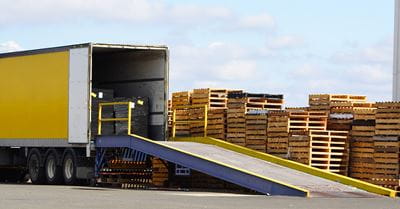Ramping Up Productivity: How Yard Ramps Can Benefit Your Business

Discover the benefits of yard ramps in boosting efficiency and flexibility for businesses.
Yard ramps are useful, durable pieces of equipment that enable the seamless movement of goods using forklifts and pallet jacks. In this article, we will explore the features and applications of the two primary types of yard ramps: mobile yard ramps and stationary yard ramps. Understanding their benefits in enhancing efficiency and flexibility in various industrial settings is crucial.
Yard Ramp Basics
Both mobile and stationary yard ramps are mostly built from steel, although lightweight aluminum options are also available. Ramps are designed with varying lengths, typically falling within the range of 30 to 40 feet. While mobile ramps feature solid pneumatic tires for easy positioning, stationary ramps are permanently or semi-permanently installed. Ramp surfaces are commonly made of steel grating or diamond plate, with side rails preventing vehicles from rolling off. At the elevated end, a lip extends over the trailer floor or loading dock edge for seamless transitions.
Mobile Yard Ramps
Mobile yard ramps are designed mainly for locations without a loading dock. Equipped with solid pneumatic tires, these ramps can be easily positioned and rotated using a forklift. The angle of the ramp can be adjusted using a hydraulic pump. Mobile ramps offer flexibility and adaptability, making them ideal for temporary job sites or businesses that require mobility. They can accommodate various vehicle heights and provide a quick setup, enabling efficient loading and unloading operations.
Stationary Yard Ramps
Stationary yard ramps are primarily used in buildings with loading docks. These ramps do not require frequent relocation, as they are permanently installed. Made of durable steel, stationary ramps offer a stable pathway for efficient loading and unloading. They are particularly beneficial for facilities that require constant movement between the dock and ground, ensuring uninterrupted workflow and improved productivity. Stationary ramps are a reliable option for businesses with consistent accessibility needs.
How Are Yard Ramps Used?
Mobile and stationary yard ramps find applications in various industrial scenarios, enhancing efficiency and flexibility.
● Dock Overflow: When a warehouse experiences a temporary increase in demand or requires additional loading dock slots, yard ramps offer a practical solution without the need for construction, expanding capacity on a temporary basis.
● Ground to Dock: Yard ramps allow unrestricted movement of forklifts, light trucks and other vehicles from ground level to a raised dock position, or from dock to ground.
● Storage Yards: Yard ramps are frequently utilized in industrial storage yards where traditional loading docks are not available. They provide a convenient means of loading and unloading materials and equipment.
● Equipment Loading / Unloading: Mobile yard ramps are commonly used for loading heavy equipment onto transport vehicles in industries such as oil & gas, construction, mining, forestry, and more. They enable efficient loading and unloading processes, improving overall productivity.
● Work Sites: Construction sites and remote work locations often require mobile yard ramps for various tasks such as transporting military supplies, agricultural totes, equipment for outdoor concerts and events, and more.
Learn More About Yard Ramp Options
Both mobile and stationary yard ramps play vital roles in enhancing efficiency and flexibility in industrial operations. Mobile ramps offer portability, adaptability, and quick setup, while stationary ramps provide a stable pathway for consistent access between loading docks and ground level. If you would like to learn more about yard ramps for your business, contact a material handling professional at Raymond West today.

